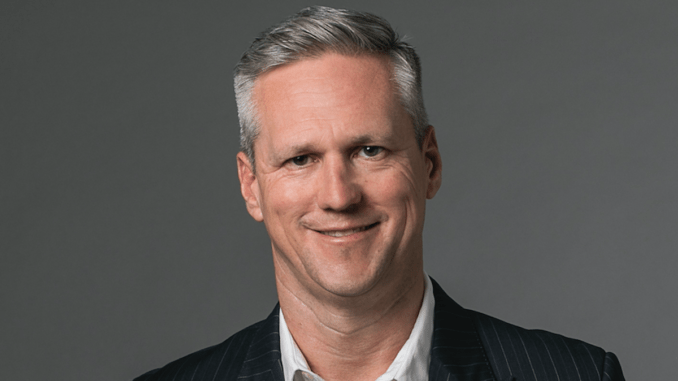
Artificial Lawyer spoke to two of Deloitte’s leaders on the legal consulting side of the business. We looked at the new alliance with Thomson Reuters and the Big Four firm’s wider strategy when it comes to working with legal departments.
Steven Walker (pictured above), is a Managing Director at Deloitte Legal Business Services and based in California, while Jack Diggle is the global lead partner for Deloitte’s Legal Management Consulting practice, and is based in London. Both had stints at Elevate before joining what is one of the largest professional services firms on the planet.
First, the Thomson Reuters (TR) deal. Part of this was around tax matters and the software TR provides there. But the other half of the alliance is on legal tech and consulting to inhouse teams. This site asked: which of TR’s products is going to play a key role for Deloitte?
Walker explained that the focus will be on TR’s Legal Tracker, which is ‘legal ops’ software that allows law firms and inhouse teams to handle ebilling, matter management, and generate workflow data that can then be analysed. HighQ will also be important.
‘HighQ allows no-code workflow development,’ Walker noted, and added that with Deloitte’s teams of tech experts they will be a ‘scaled implementer of those products’.
However, Walker also stressed that they remain – despite the long-term relationship with TR, which is now more formalised in the alliance – a business that is tech agnostic and they are also working with many other tech companies.
At this point Artificial Lawyer asked how this worked, is Deloitte now a ‘re-seller’ of TR’s products? Walker explained that no, it didn’t work like that. They remained totally independent. I.e. clients got a bill from Deloitte for consulting work, and if they decided to go with a TR product they got a bill from TR – or from any other tech provider the client chose. The two remain at arm’s length.
Diggle then added: ‘We are not selling Thomson Reuters products. But, they have a toolkit that is appropriate for the work that we are doing.’
Deloitte also have a good working knowledge of, and expertise with, several of the leading CLM software providers, they added.
The Strategy

So, that’s TR. What about the wider strategy? What is Deloitte’s goal?
Diggle’s key point here is that you have to remember that Deloitte is a provider of services to the whole of a business, not just legal. They come to corporates with a truly full spectrum enterprise mindset.
‘We do digital transformation of entire companies, not just the legal team, and Deloitte is able to play a broader enterprise role,’ Diggle explained.
‘We try to offer an integrated solution and law is part of this wider transformation.’
He then noted that enterprise tools such as ServiceNow and Salesforce can be deployed throughout the business and connect into the legal team.
He also pointed out that CLM companies are increasingly viewing themselves as enterprise solutions, not as a series of point solutions for just the legal team. And this is how Deloitte sees things – which makes sense when you consider that for this $50 billion annual revenue firm, legal is just a small part of what it is focused on.
At this point it’s worth adding that all of this also connects to its growing Legal Managed Services (LMS) arm – which readers will remember Luminance’s former CEO, Emily Foges, is now part of in London. I.e. they are advising and providing services on both sides of the line: consulting with legal teams to help them operate better as part of the wider business, and then providing LMS capabilities to handle things such as contracting to improve efficiency. Deloitte also provides good old-fashioned legal advice as well, in the markets where this is allowed.
Driving Efficiency
Now we get to the meat of the subject: data and change.
As Walker noted, the goal is to help the legal teams to work better, to be more efficient, to connect in a positive way with the rest of the enterprise. But, you can’t just come into an inhouse team and change things. You need to gather data about what they are doing so that you can then improve things. As the saying goes: ‘You cannot improve what you don’t measure.’
‘The goal is to help legal form a seamless part of the value chain [of the business],’ he said. ‘Some legal teams just want workflow automation, for example. But the key is how do we build that digital core, and how does it link to the rest of the enterprise?’
He then noted that to work in this way you have to gain insight into what the legal team is actually doing on a day to day basis, how it works, what it works on, how much time is spent on certain types of matter.
And this is where the tech comes in. With tools like Legal Tracker and others, the inhouse team can gather that data and then with Deloitte’s consulting experience and understanding of how the entire business works, from sales, to procurement, to logistics, to compliance, to finance, they can help to build workflows that drive real value across the company and into the legal team and back out again.
Walker also noted one burning issue: how do you know if sending work out to a law firm will be more economical, or more efficient, than doing it internally if you have no data to make a judgment? You need billing data for the external parties, and you need data on your own workflows to decide how much resource went into that work when you did it internally. Ironically that can sometimes include the amount of time the inhouse lawyers took to complete a task. But, it’s all part of gaining an objective picture of what is happening inside the legal team.
What they are doing does indeed seem to be of a different character to how some legal tech consulting groups work with inhouse teams. The reason is that, as they mention, they are taking a ‘whole enterprise’ approach. They may work with a legal team on a particular matter, but they’re thinking about how it connects to the rest of the business.
Or as Walker puts it: ‘We work with the COO, the CIO, and CFO of the business.’
While Diggle added that they are taking a multi-disciplinary approach, e.g. legal work, tech provision, and consulting on legal ops, but all that is still just part of ‘a broader ecosystem of services that Deloitte can provide for the clients’.
‘We can do digital transformation of the entire company, not just legal,’ he reiterated.
The Future
This is all very encouraging and the enterprise approach chimes with messages increasingly coming out of the inhouse and CLM provider world about moving beyond seeing legal team change as a siloed activity.
But, how many clients want this change? It’s a question this site has asked the CLM companies as well. For all the availability of tech and consulting input, and LMS provision, do the clients want this? Have legal teams got the appetite for change, or would they prefer to keep doing the same old thing which has worked in the past, even if it was expensive and sometimes inefficient?
Diggle agreed that in the past ‘change was glacial’, but there are real signs of inhouse teams warming up to what is possible – at least some of them.
‘Change is hugely uneven,’ he added, ‘but it has never moved faster than now.’
To conclude, from this site’s perspective the clients’ will to do something different, to search for something better, is the key here. The providers of tech and services are all there now, from small companies to giants such as Deloitte and Thomson Reuters. The world just needs the clients to activate the change that is possible. And, it sounds like that is now starting to happen.
2 Trackbacks / Pingbacks
Comments are closed.